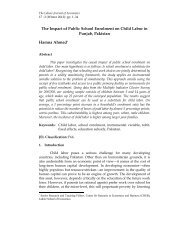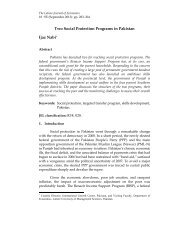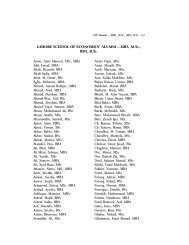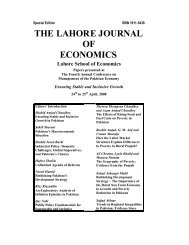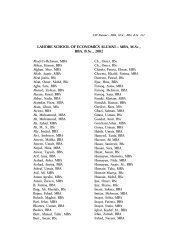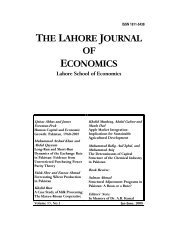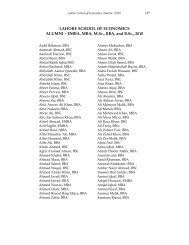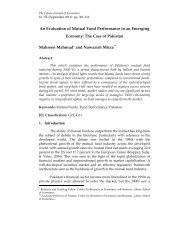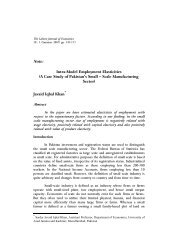Special Edition-07.pdf - Lahore School of Economics
Special Edition-07.pdf - Lahore School of Economics
Special Edition-07.pdf - Lahore School of Economics
You also want an ePaper? Increase the reach of your titles
YUMPU automatically turns print PDFs into web optimized ePapers that Google loves.
168<br />
Naheed Zia Khan<br />
already raging controversy around agricultural subsidies and has stirred<br />
anger in developing countries. 20<br />
The EU is no less harmful. Its farm reforms may be radical by the<br />
organization's undemanding standards but will not be enough to satisfy the<br />
rest <strong>of</strong> the world. For example, even though its production costs are more<br />
than double to that <strong>of</strong> Asian and Latin American countries having a natural<br />
comparative advantage, the EU is now the second largest sugar exporter<br />
from being a net importer 30 years ago. The EU spends about $3.3 billion<br />
annually in supports on sugar exports, and in mid-2002 was paying its<br />
producers a guaranteed price three times that was being <strong>of</strong>fered on the<br />
world market. Due to EU subsidies, prices on the world sugar market have<br />
fallen by 17%. 21 However, the sugar subsidy is only the tip <strong>of</strong> the iceberg.<br />
The annual dairy subsidy in the EU is $913 per cow, which is almost double<br />
the per capita income <strong>of</strong> Sub-Saharan Africa at $490 and 114 times the<br />
annual per capita aid given by the EU to this region. It gets worse when it<br />
comes to Japan, where each cow gets $2,700 to chew each year, a figure<br />
that is more than five times the per capita income <strong>of</strong> sub-Saharan Africa<br />
(UNDP 2003).<br />
Conclusion<br />
Being a developing open economy, the success <strong>of</strong> Pakistan’s<br />
agricultural reform efforts is conditional on the international market<br />
situation. Agriculture stands out as the most distorted part <strong>of</strong> the world<br />
economy. The most damaging feature <strong>of</strong> the Common Agricultural Policy<br />
(CAP) <strong>of</strong> the EU and <strong>of</strong> the US Farm Support Program is that agricultural<br />
subsidies are tied to production, with surpluses dumped on world markets<br />
via the payment <strong>of</strong> export subsidies. The sufferers are mainly developing<br />
countries, many <strong>of</strong> whose economies depend heavily on agriculture. For<br />
most developing countries, phasing out all farm-export subsidies is the<br />
biggest single objective <strong>of</strong> the Doha round.<br />
20 Indeed, Brazil has lodged a legal challenge against the US at the WTO, charging that it<br />
is in breach <strong>of</strong> the “peace clause” <strong>of</strong> the Organization's AoA. The clause, ironically<br />
introduced at the insistence <strong>of</strong> the US and EU during the UR trade negotiations, protects<br />
a country from challenge to its subsidy regimes as long as it does not raise them beyond<br />
levels set in 1992. No African or Asian nation has yet filed a legal suit at the WTO<br />
against the developed countries’ farm subsidies. Many are cash-strapped, dependent on<br />
aid and debt relief from the very countries they would be challenging. Many are also<br />
wary <strong>of</strong> the potential for retaliatory action.<br />
21 See http://www.business-standard.com, August 7, 2003.



